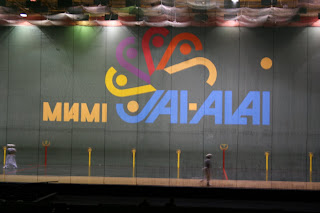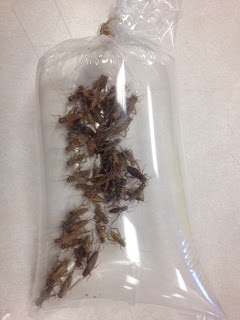FOLLOWING THE MIAMI RIVER: MIAMI JAI ALAI

A group of elders, both men and women, Haitians and Cubans mostly, meet at the entrance waiting for the door to open at eleven o'clock. For a dollar they enjoy air conditioning, deteriorating facilities, a good Cuban cortadito, Cuban sandwiches and a handful of friends in exile.
Margarita gets my dollar. She´s been working at the box office for thirty years and welcomes all visitors. They are all regulars. She fondly remembers the days of lights and stars of the Jai Alai; the visit of the famous and powerful, the big bets and first ladies. She warns me that despite its current condition, the Miami Jai Alai was a distinguished place where people dined in formal wear and movie stars celebrated their winnings with champagne. Back then the Basque Ball was an event in Miami. Nowadays the Miami Jai Alai is a forgotten place.
The frontón is a huge place. It has a capacity of more than six thousand people. The court is separated from the stands by a metal grille that resembles that of a chicken cage, patched in some areas. The rows of chairs while old, are comfortable and in relatively good shape. The bettors are reunited with their tickets in hand. Today there are fewer than a hundred people.
The national anthem plays and the audience remains solemn and silent. Some are put hand on heart. The presentation of the players follows, sixteen in total divided into eight teams. They wear helmets and light shirts with numbers and they all adjust their baskets in place.
"I love number seven, Jon is his name"- my neighbor in the back row seat informs me. She is a Haitian woman in her forties who comes to play in her spare time. She asks me if I've ever seen a game of Jai Alai. I lie; I say no. I like to hear her spicy Creole accent. She explains the origin of the game, the rules from basics. She provides me with technical details of the basket and the ball. She instructs me in the art of deciphering the electronic board and motivates me to play on the grounds that she once won $ 4000. "They pay good money ". It is almost an indoctrination.
My friend Carina arrives an hour later. We see a couple of games. The ball sounds hard -like a golf ball- on the floor and wall of the frontón. Players move fast, sometimes they even walk on the wall or are thrown to the floor trying, in a sudden movement, to push the ball from the basket to the wall. The force is huge. It would not surprise me if one of these days the ball comes flying with basket and arm and all. The haitian lady told me that the ball could reach a speed up to 60 mph.
There´s only one thing left to do: gamble. At the box office a Colombian lady explains the business of betting: the Quinela, the Trifecta, the Superfecta. But we are a couple of donkeys. I just choose four numbers: 8 Goikoetxea, 3 Irastorza, 6 Aitzol and 7 Jon (I got a tip on this one) I paid two dollars. I Just think of the $ 4,000. I would use it to pay a couple of debts or a shopping spree (whatever comes first).
The lights dim, the music plays, players grudgingly salute and the game begins. The ball jumps and rebounds at both ends of the court. The referees whistle, people yell and the players rotate. We try to understand this team`s rotation and the thousands of numbers on the screen. The tension grows. We do not understand a thing. Bettors stand and shout. I hear insults: Eat shit! Descara'o! Hopefully none of the insulted players belongs to E.T.A.
The lights turns on. Winners go to the box office to collect. Losers launch tickets through the air. Clueless, we go to the box office. The Colombian lady encourages us to test our "beginners luck" again and Margarita tells us that now is when things get started.
But enough already! Too much excitement for a Monday morning.


Comentarios
Publicar un comentario